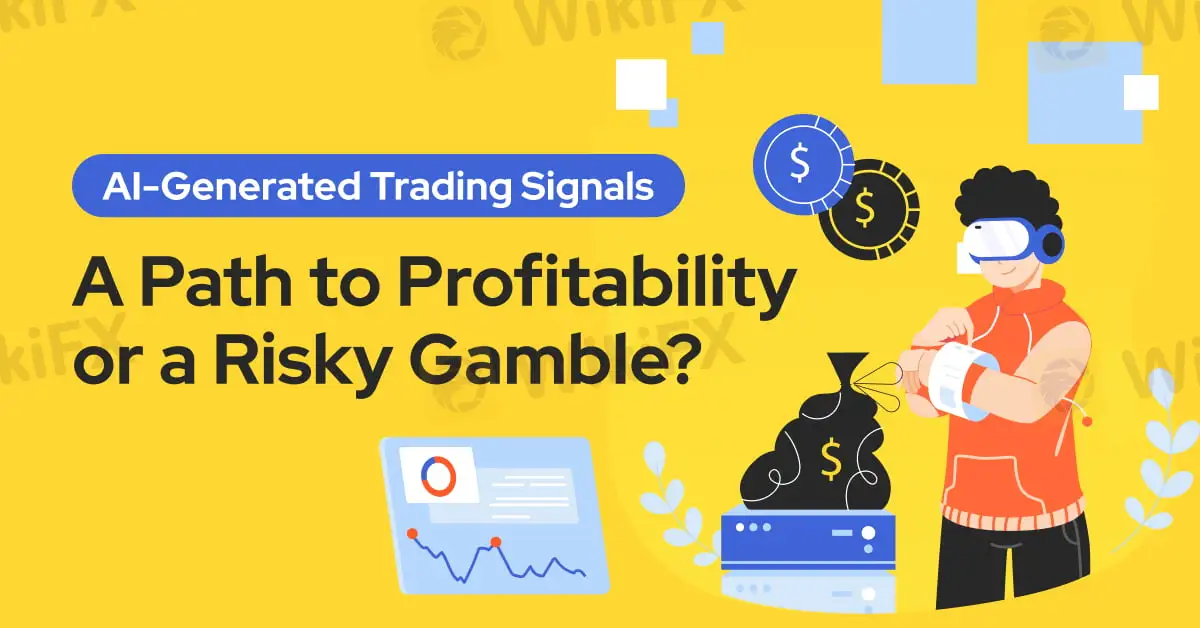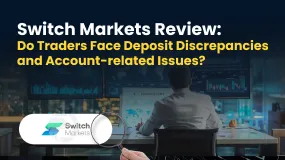简体中文
繁體中文
English
Pусский
日本語
ภาษาไทย
Tiếng Việt
Bahasa Indonesia
Español
हिन्दी
Filippiiniläinen
Français
Deutsch
Português
Türkçe
한국어
العربية
AI-Generated Trading Signals: A Path to Profitability or a Risky Gamble?
Abstract:The adoption of AI in analysing markets and generating trading signals is growing rapidly. The question that lingers, however, is whether relying on AI-generated trading signals can truly make traders profitable

In recent years, artificial intelligence (AI) has taken the financial world by storm, with many claiming that it holds the key to revolutionizing trading strategies. From hedge funds to individual retail traders, the adoption of AI in analysing markets and generating trading signals is growing rapidly. The question that lingers, however, is whether relying on AI-generated trading signals can truly make traders profitable. Is it a golden ticket to consistent returns, or a technological gamble with uncertain outcomes?
Artificial intelligence has made impressive strides in recent years, with its capacity to process vast amounts of data and detect patterns that would be impossible for a human to identify. AI-based trading signals are built on complex algorithms that analyse historical market data, price movements, news sentiment, and even social media trends. By doing so, these systems can generate buy or sell signals, allowing traders to make decisions based on the data-driven insights produced by AI.
In theory, AIs ability to process data without emotional bias should give traders an edge. After all, markets are often driven by irrational behaviours, fear, and greed. AI could, in principle, cut through the noise, providing cold, calculated recommendations that outperform emotionally driven decisions.

- Speed and Efficiency: AI can process immense volumes of data in real-time, providing traders with near-instantaneous signals. This speed is particularly important in fast-moving markets, where seconds can make a difference between profit and loss.
- Eliminating Emotion: Traders often make mistakes due to psychological factors like fear, greed, and overconfidence. AI systems operate purely on logic and data, which helps to eliminate the emotional biases that human traders might face.
- Identifying Complex Patterns: AI algorithms can uncover market patterns and trends that might not be obvious to even the most seasoned traders. Machine learning models are continuously improving, meaning that over time, AI can adapt to changing market conditions and fine-tune its signal accuracy.
- Back testing and Optimization: AI systems can back test their models on historical data, allowing traders to see how a strategy would have performed in the past. This gives traders a clearer idea of potential risks and rewards before they put real capital at stake.
With all these benefits, its tempting to view AI-generated signals as a surefire way to achieve success in trading. However, as with any technology, there are potential pitfalls and uncertainties that traders must consider.

- Overfitting to Past Data: AI systems often rely on historical data to generate predictions. One major issue is overfitting—when an algorithm is trained too closely on past data, it may perform well in simulations but fail when faced with new, unseen market conditions. Just because a system worked in the past does not guarantee future success, especially in a volatile market.
- Market Unpredictability: Financial markets are driven by a complex mix of factors, including political events, economic data, and unforeseen global crises. AI, no matter how sophisticated, cannot predict black swan events or sudden market crashes. AI models may also struggle in chaotic, low-liquidity environments, where price movements are driven more by irrational human behaviour than by predictable patterns.
- Blind Trust: Another risk is that traders may become overly reliant on AI-generated signals without fully understanding the rationale behind them. Trusting AI blindly can lead to poor decision-making, especially when the system is prone to errors or misinterpretation of data. Traders must remember that AI is a tool, not a crystal ball, and should always cross-verify with their own analysis.
- Regulatory and Ethical Considerations: AI-driven trading is still a relatively new frontier, and there are growing concerns about its regulatory oversight. Some worry about the ethical implications of algorithmic trading, especially when market manipulation or flash crashes are linked to automated systems. Traders who rely on AI must also be aware of evolving regulations that may affect the future use of such technology.
Given these challenges, a balanced approach may be the key. AI should not be seen as a replacement for human judgment but rather as a supplementary tool. Traders who combine AI-generated signals with their own expertise and market knowledge are likely to be better positioned to manage risks and navigate the complexities of trading.
AI can offer valuable insights and help traders filter through the vast amount of market data, but ultimately, it is the trader who makes the final decision. Experienced traders may find that AI helps them avoid common pitfalls, while less experienced traders may use AI as an educational tool to improve their understanding of the market.
In summary, the question of whether AI-generated trading signals are trustworthy and capable of making traders profitable remains open to debate. While AI offers clear advantages in speed, data processing, and emotion-free decision-making, it also presents risks related to market unpredictability and algorithmic errors. For traders looking to use AI, the best approach may be to strike a balance—leveraging AI's strengths while remaining vigilant and relying on their own analysis to make informed decisions. Ultimately, AI in trading should be viewed as a powerful tool, but not the sole determinant of success. The road to profitability still depends on a combination of technology, skill, and human intuition.

Disclaimer:
The views in this article only represent the author's personal views, and do not constitute investment advice on this platform. This platform does not guarantee the accuracy, completeness and timeliness of the information in the article, and will not be liable for any loss caused by the use of or reliance on the information in the article.
Read more

Switch Markets Review: Do Traders Face Deposit Discrepancies and Account-related Issues?
Do you fail to deposit your funds into the Switch Markets forex trading account? Earned profits, withdrew them too, but did Switch Markets block your deposits? Wanted to close your trading account due to payment-related issues, but in turn got your emails blocked by the Australia-based forex broker? Faced a negative trading account balance because of illegitimate trade order execution? Many traders have shared these stories about Switch Markets on broker review platforms. In this Switch Markets review article, we have mentioned the same. Read on!

Is IEXS Safe or a Scam? A 2025 Review Based on 13 User Complaints and Regulatory Red Flags
You're asking a direct and important question: Is IEXS safe or a scam? As someone who might trade with them or already does, this is the most important research you can do. While IEXS says it is a global broker with over ten years of experience, a detailed look at its regulatory status and many user reviews shows serious warning signs that cannot be ignored. The evidence suggests a high-risk situation for traders' capital. This review will examine the available information, from official regulatory warnings to concerning first-hand user complaints, to give you a clear and fact-based view of the risks involved in trading with IEXS. Our goal is to give you the facts you need to make a smart decision.

Having Trouble Getting Your Funds Out of IEXS? A Simple Guide to Delays and Solutions
Are you having trouble withdrawing funds from your IEXS account or facing delays getting your funds? Not being able to access your own capital is one of the most stressful situations any trader can face. It breaks down your basic trust with a broker. This isn't just annoying - it's a serious problem that can mess up your financial plans and cause a lot of worry. This guide goes beyond basic advice. We'll look at real user experiences and official regulatory information to give you clear answers. Our goal is to help you understand why IEXS withdrawal problems happen and show you practical steps you can take. We understand your concerns and want to give you the information you need to handle this tough situation.

Simulated Trading Competition Experience Sharing
Champion Strategy Revealed: Get a Head Start on Winning
WikiFX Broker
Latest News
Trillium Financial Broker Exposed: Top Reasons Why Traders are Losing Trust Here
FIBO Group Ltd Review 2025: Find out whether FIBO Group Is Legit or Scam?
Amillex Withdrawal Problems
Is INGOT Brokers Safe or Scam? Critical 2025 Safety Review & Red Flags
150 Years Of Data Destroy Democrat Dogma On Tariffs: Fed Study Finds They Lower, Not Raise, Inflation
CQG Partners with Webull Singapore to Power the Broker’s New Futures Trading Offering
【WikiEXPO Global Expert Interviews】Ashish Kumar Singh: Building a Responsible and Interoperable Web3
Trump: India\s US exports jump despite 50% tariffs as trade tensions ease
IEXS Review 2025: A Complete Expert Analysis
CySEC Flags 21 Unauthorized Broker Websites in 2025 Crackdown
Currency Calculator



